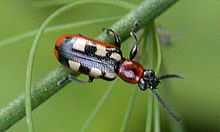Common asparagus beetle

| Common Asparagus Beetle | |
|---|---|
 | |
| Scientific classification | |
| Kingdom: | Animalia |
| Phylum: | Arthropoda |
| Class: | Insecta |
| Order: | Coleoptera |
| Suborder: | Polyphaga |
| Superfamily: | Chrysomeloidea |
| Family: | Chrysomelidae |
| Subfamily: | Criocerinae |
| Tribe: | Criocerini |
| Genus: | Crioceris |
| Species: | C. asparagi |
| Binomial name | |
| Crioceris asparagi (Linnaeus, 1758) [1] | |
| Wikispecies has information related to: Common asparagus beetle |
The common asparagus beetle (Crioceris asparagi) is an important pest of asparagus crops both in Europe and in North America. Asparagus is its only food plant. The beetle is about half a centimeter long, metallic blue-black in color with cream or yellow spots on its red-bordered elytra. The larvae are fat gray grubs with dark heads.
The adult beetles and the larvae strip the needle-like leaves off the asparagus fronds, depriving the plants of the ability to photosynthesize and store energy for future years. They also chew the spears and lay generous amounts of eggs on them, making the crop unmarketable. The larvae feed on the plants for a few weeks, then drop to the ground to pupate. One year may see two or three generations of the beetle. The adults overwinter in a dormant state underground or in nearby leaf litter.
Various insecticides are licensed for control, and the parasitic wasp Tetrastichus asparagi Crawford has been successfully used for biological control.
The similar spotted asparagus beetle (Crioceris duodecimpunctata) is also a pest as an adult, feeding on tender shoots and leaves, but since the larvae feed only on the asparagus berries it is not considered to be as important.
References
- HYPP Zoology info page
- Cranshaw, Whitney. (2004). Garden Insects of North America. Princeton University Press ISBN 0-691-09561-2